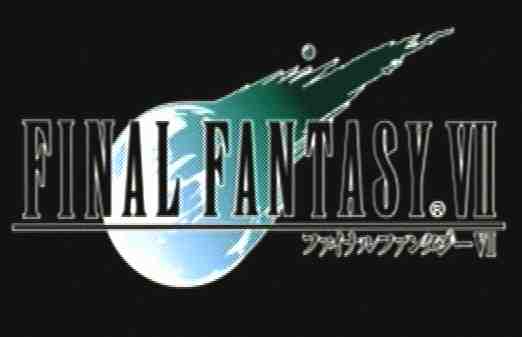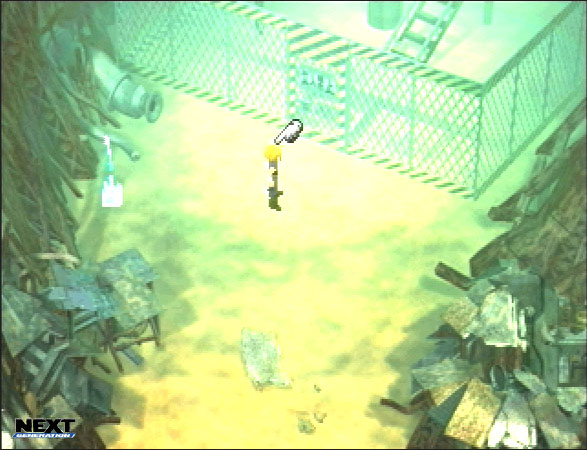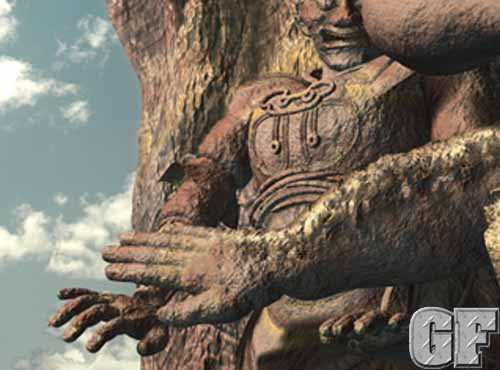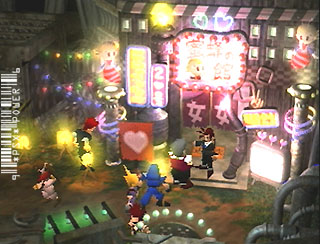 |
FInal Fantasy VII- Review |
 |
En Amaritudine Loquor Me Menti
By: Castomel
| Review Breakdown |
| Battle System |
5 |
| Interface |
6 |
| Music/Sound |
9 |
| Originality |
7 |
| Plot |
9 |
| Localization |
4 |
| Replay Value |
8 |
| Visuals |
9 |
| Difficulty |
Easy |
| Time to Complete |
25-60 hours
|
|
| Overall |
 |
| Criteria
|

|
| |
Okay, so I'm not particularly bitter, despite the title.
It's just that everyone's heard the preceding line to this one, I think.
It goes a little something like this: "Estuans Interius/Ira Vehementi."
It's a matter of fact that Nobuo Uematsu, the man responsible for the
music of Final Fantasy VII ripped off not only the lyrics from Carmina
Burana to make the song One Wing Angel sound that much better, but he
also sneaked in some of the tune as well. Then again, imitation is the
highest form of flattery, and it's probably forgivable in this instance,
since the rest of the soundtrack, and indeed the game, is widely different
from any prior titles. Final Fantasy VII changed the face of RPGs, and
is generally viewed as the dividing point between old-school and new-school.
Nonetheless, it managed to retain enough of the magic of older RPGs to
become a favourite of many. This dichotomy is what has kept the game the
subject of endless debate by its fans and detractors- and what makes it
a very worthwhile title.
The message behind Final Fantasy VII is none-too-subtle,
and is introduced with all the delicacy of a brick in the face. The game
begins with the destruction of a Mako Reactor, as orchestrated by the
terrorist group Avalanche. As the mysterious character Cloud, the player
quickly becomes engulfed in events, and motivation switches from money
to saving the planet. Why? Well, it could be the painfully constructed
love triangle that is central to the story. Or, it could be because everyone
loves the planet at heart. Or it might just be circumstances spiralling
out of control. Whatever the case, and notwithstanding the size of various
polygons that might just influence a young man's decision, Cloud gets
caught up in the adventure, and the quest to save the planet begins.
As in any such quest, there'll be fighting, and this turns out to be
standard Final Fantasy fare. The materia system is functional, granted,
but it reduces characters to virtual anonymity, at least in battle. When
the only difference between a big tough man and a waifish teenage girl
is whether or not they can cast Fire or summon Knights of the Round, reality
probably isn't being adequately portrayed. Yes, materia is what drives
the battle system(and incidentally, is also a Latin word cannibalized
from the same section of Carmina Burana. Live and learn!). Materia, which
is a wide array of shiny, varicoloured stones, comes in a number of different
forms, and can be used to do anything from summon chocobos to adding skills.
They are socketed into armour and weapons, which adds another element
to what equipment is used; equipment holds varying numbers of slots, and
since materia is advanced through obtaining AP in battle, the ability
of some items to double or triple the rate at which this accumulates can
be important in deciding what to equip characters with(or at any rate
is a better basis for selection than how keen a weapon looks, which is
more or less the best way to choose characters for use in the main party).

|
| Where Acid Rain is Made
|
|
Square can perhaps be excused for making things excessively
simple. Final Fantasy VII was aimed at a much wider target audience than
previous titles, and so simplicity in the battle system is probably a
good thing. This functional approach was also taken with the game's mechanics,
which extends to both the materia system and the equipment. Weapons and
armour have been curtailed in number, creating a minimum of mucking around
in equipment screens. Items remain fairly numerous, but the game's mechanics
are quite reminiscent of Chrono Trigger's in their simplicity, which is
by and large a good thing. Unfortunately, the battle interface can be
slightly clogged, and a number of graphical options do serve to clutter
the screen more than improve functionality. This is also true of dungeon
screens, when the arrows and the cursor, while necessary at times, can
be annoying at others. Nevertheless, all things considered, it is adequately
done.
When Final Fantasy VII was aimed at a wider audience, every attention
was immediately given to appearance, both aurally and visually. Nobuo
Uematsu is perhaps at his best here, both in variety and in sheer volume.
The game features a wide number of musical selections with an equally
wide variety of genres. With perhaps the best final boss music of any
game, Uematsu has done his work exceptionally well here. So too has Square's
art department, who have provided what is a great-looking game for its
time. While a few years have aged Final Fantasy VII's graphics somewhat,
their groundbreaking nature, most notably what was awe-inspiring FMV when
it first came out, and the pre-rendered backgrounds, which featured very
careful attention to detail, the graphical experience that Final Fantasy
VII offered left many people likening the game to an interactive movie
rather than the RPG it is billed as. While the subsequent shift the genre
made to keep up with the advancements the game brought about made this
definition largely irrelevant, it certainly seemed at least partially
true at the time; however, despite what could be considered the eye-candy
nature, Square did manage to inject that ineffable quality that characterizes
their better games and is responsible for the reputation the developer
has.
Perhaps it is the game's storyline and the underlying themes that give
Final Fantasy VII that certain something. Despite a pretty badly botched
translation, the story that did manage to make it through came across
as a very deeply thought-out plot, which possessed a degree of subtlety
hitherto unheard of in a video game. The game's exploration of such themes
as perception, good and evil, and humanity's influence on the world are
just a few of the more obvious examples of what the story examines. At
more subtle levels there is a great deal more to be explored, and it is
thus necessary to play the game through more than once to fully appreciate
just what is happening. While the translation is in part responsible for
some of this obscurity, it is the fact that the game actually makes people
think that lends the most complexity to the story, and the fact that the
game's ending sequence is very ambiguous only adds to the mystique of
Final Fantasy VII.

|
| A Slap on the Wrist |
|
Another intangible that Final Fantasy VII offers is its
wealth of mini-games. Players have the ability to breed chocobos, play
in a number of arcade-like games with seemingly no purpose, and for the
true gambling addict, bet on chocobo races in which they aren't even involved.
Each of these games, however, does serve a purpose, as a number of rare
items can be obtained by completing the mini-games. These are the areas
that give Final Fantasy VII much of its replayability; while the story,
which is quite extensive, is certainly worth playing through the game
a second or third time for, the mini-games themselves can occupy many
hours of time. In fact, Final Fantasy VII possesses what are perhaps the
best mini-games to be found in any title, save possibly for the Triple
Triad game for Final Fantasy VIII.

|
| Yes, it IS That Scary Inside. |
|
Despite the fact Final Fantasy VII has a great deal of upside, its detractors
do have a number of legitimate concerns. The battle system is rather incidental
to the game, and the localization does leave a bit to be desired. Additionally,
aside from the rich backstory that goes into each, character development
is largely restricted to a few characters. Nonetheless, the good does
outweigh these shortcomings, and does so convincingly. Any gamer looking
for an enjoyable game that is sure to endure in their memory would do
well to pick up Final Fantasy VII, because it deservingly owns a prominent
place in RPG history.
|










